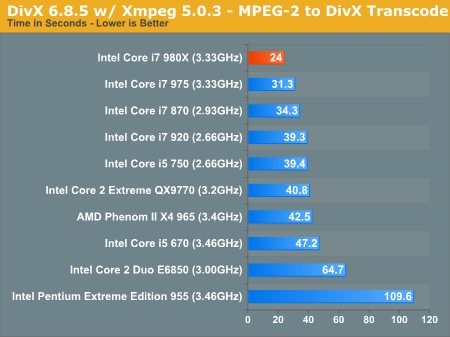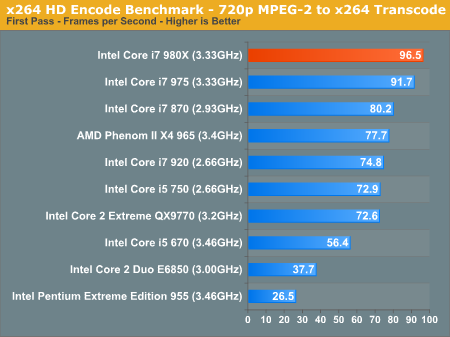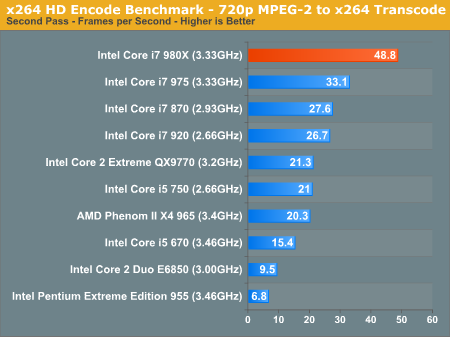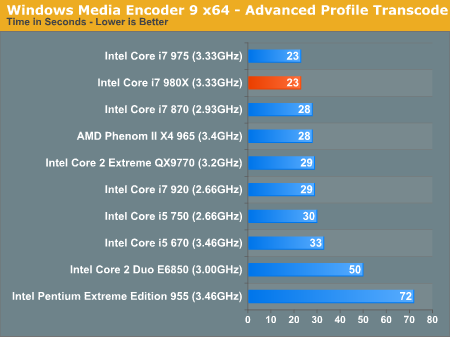The Core i7 980X Review: Intel's First 6-Core Desktop CPU
by Anand Lal Shimpi on March 11, 2010 12:00 AM EST- Posted in
- CPUs
DivX 8.5.3 with Xmpeg 5.0.3
Our DivX test is the same DivX / XMpeg 5.03 test we've run for the past few years now, the 1080p source file is encoded using the unconstrained DivX profile, quality/performance is set balanced at 5 and enhanced multithreading is enabled:

Our DivX and WME tests are getting long in the tooth. Most serious encoding is done using H.264 now, but I included these results to show that even in lighter workloads the 980X can still manage to pull ahead of the 975. The 980X is 30% faster in our DivX encode test, and it completes the encode in less than a quarter of the time of the old Pentium EE 955.
x264 HD Video Encoding Performance
Graysky's x264 HD test uses the publicly available x264 codec (open source alternative to H.264) to encode a 4Mbps 720p MPEG-2 source. The focus here is on quality rather than speed, thus the benchmark uses a 2-pass encode and reports the average frame rate in each pass.

To see what 6 cores and 12 threads can do we needn't look any further than the second (encoding) pass of our x264 benchmark:

The Core i7 980X is nearly 50% faster than the Core i7 975, 76% faster than the i7 870 and over twice the speed of the QX9770. This is a greater performance jump than we've seen from any single architectural shift. If you are serious about video encoding, you want Gulftown.
Windows Media Encoder 9 x64 Advanced Profile
In order to be codec agnostic we've got a Windows Media Encoder benchmark looking at the same sort of thing we've been doing in the DivX and x264 tests, but using WME instead.

Our Windows Media Encoder 9 test is the lightest of our video encoding tests. Without stressing the additional cores, the 980X performs no different from the 975.










102 Comments
View All Comments
cactusdog - Thursday, March 11, 2010 - link
This wont be the only i7 6 core desktop CPU. Intel are being sneaky to milk the market. There will be another one or possibly 2 at mainstream prices. The cheapest Xeon gulftown is only $400 (2.26Ghz) so why would Intel ignore desktop when X58 boards will happily run a Xeon?GourdFreeMan - Thursday, March 11, 2010 - link
That strategy could just as well backfire on Intel. If you have to wait six months for the other hexacore desktop Gulftowns, you might as well forgo Gulftown entirely and wait a year to fifteen months for hexa/octocore Sandy Bridge. The new AVX instructions in Sandy Bridge are likely to have a far broader impact on performance in terms of software anyway...Triple Omega - Thursday, March 11, 2010 - link
Well I hope you're right. As right now it looks like even Sandy Bridge releasing at least 26 months after the 920 will still have only 4 cores maximum. Not much of a replacement.Also, did anyone notice they broke their own Moore's-Law rule? The 980X only has 1,6 times the transistors of it's predecessor.
DrMrLordX - Friday, March 12, 2010 - link
As I posted above:http://en.wikipedia.org/wiki/List_of_future_Intel_...">http://en.wikipedia.org/wiki/List_of_fu...rocessor...
JumpingJack - Thursday, March 11, 2010 - link
"Also, did anyone notice they broke their own Moore's-Law rule? The 980X only has 1,6 times the transistors of it's predecessor. "You have a fundamental misunderstanding of Moore's Law, this is not unexpected because it is often misquoted or misrepresented in the less technically oriented press. The proper way to state Moore's law is the transistor count will double roughly every two years for the same die size, or for the same transistor count the die size will half. Yet the best way is to simply say the transistor density (transistor/unit area) will double.
You can check the 32 nm adherence to Moore's law by following up on the technical presentations that float around the web, Intel published their IEDM 2009 32 nm stuff:
Also, did anyone notice they broke their own Moore's-Law rule? The 980X only has 1,6 times the transistors of it's predecessor.
http://download.intel.com/technology/architecture-...">http://download.intel.com/technology/ar...-silicon...
See the scaling for gate pitch or SRAM cell size slides 5 and 6, they are clearly falling right on the Moore's law path.
This is not by accident, a linear scaling factor of 0.7 when squared is 0.49 or roughly 0.5 i.e. half the area, this factor is chosen to get double the transistor density each technology node.
talonz - Thursday, March 11, 2010 - link
"Moore's Law" refers to density, not actual transistor count. Anyone can build a big chip.tterremmotto - Thursday, March 11, 2010 - link
Actually, Moore's law has nothing to do with density nor speed. It was about price.Moore's "observation" simply stated that the price per transistor halves every 18 moths. Wether that is due to density increases or process advancement is not a necessity.
Never an observation has been so misunderstood, and yet have such a fantastic side effect.
JKflipflop98 - Thursday, March 11, 2010 - link
Actually, Moore's law is all about transistor density. I know. I see it everyday in the halls, in the elevator, at my desk, in the cleanroom. . .JumpingJack - Thursday, March 11, 2010 - link
He has a small point, Moores Law is just an obseravtion of the rate of shrinkage over time, the phenomena is driven by the economy of scale.Jack
softdrinkviking - Thursday, March 11, 2010 - link
where are you getting your xeon pricing info from?all i can find from any solid source is the current xeon quad core processors which are running about $2000 on newegg at the moment.
xeons have always carried a premium for the intel dual processor support, and imho, a cheaper xeon is going to be more "enterprise" oriented and not be a real upgrade for the home x58 platform.
again, this is pure speculation, but i think we are going to be stuck with our current i7 stuff until intel decides to do a 32 nm refresh on the home line up.
basically, what i'm trying to say is that i think any xeon capable of creaming an i7 930 is going to be WAY more expensive than the 980x gulftown on display here.